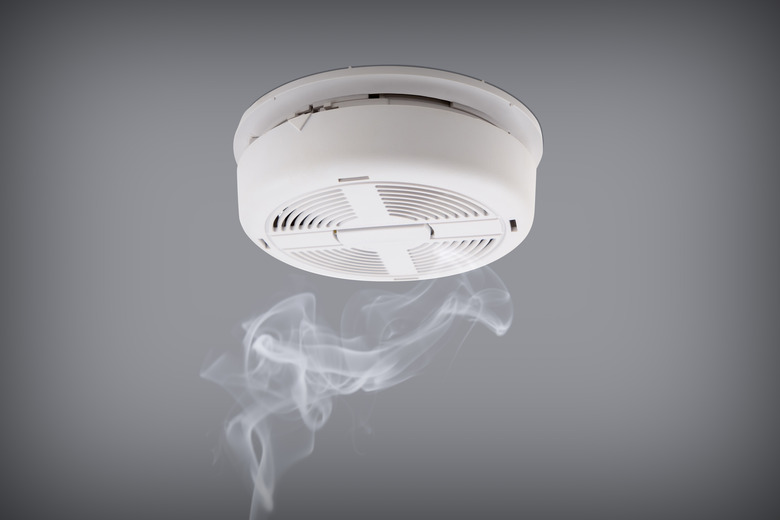Can Humidity Set Off A Smoke Detector?
Insurance companies and state fire marshals require you to have smoke detectors in your house, and when one does its job and alerts you to a fire, you'll be glad you have them. Until that happens, the best smoke detector is a quiet one. But, unfortunately, false alarms do occur. One cause is high humidity. To understand why this happens and how to prevent it, it helps to understand how a smoke detector works. The short explanation is that some smoke detectors have a hard time distinguishing moisture particles in the air from smoke.
How Smoke Detectors Work
How Smoke Detectors Work
Smoke detectors employ two basic technologies: Ionization and photoelectricity. An ionization smoke detector contains a small amount of radioactive material that continuously ionizes the air between a pair of detector plates. When smoke particles attach themselves to the ionized air molecules, the electric current passing through the ionized air is disrupted and the alarm sounds. In a photoelectric smoke detector, a light beam passes between a pair of sensors, much as it does between the safety sensors of a garage door opener. The alarm goes off when smoke interrupts the light beam.
Ionization smoke alarms aren't as common as they used to be, partly because of the problems associated with disposal of radioactive waste. However, ionization is a better technology for detecting flash fires, so manufacturers market dual alarms that incorporate both technologies, and fire marshals recommend them.
How Water Affects Smoke Alarms
How Water Affects Smoke Alarms
A fine mist of atomized water particles floats around in humid air, and while the average person can't detect it, a smoke detector can. The mist can disrupt an ionization or photoelectric beam in much the same way that smoke does, with ear-splitting results. The humidity may be hanging around in a poorly vented hallway or it may be coming from the laundry room. Dryers are notorious for spewing damp air.
Shower-generated steam is actually visible to the eye, which makes it even more likely to trip a smoke alarm. Ionization detectors are more likely to mistake humidity for smoke than photoelectric ones. That's because the water particles attach to the ionized air particles and disrupt the electric flow to the sensor plate in much the same way that smoke does.
The hush button is your friend when a false alarm occurs. Some states, including California, require manufacturers to provide this feature. It's usually located directly on the front of the cover, and pressing it stops the horn from sounding.
How to Stop Humidity from Setting Off a Smoke Alarm
How to Stop Humidity from Setting Off a Smoke Alarm
Too many false alarms are tiring and annoying and can also be dangerous. Familiarity with the noise may forestall an appropriately quick response in a real emergency. If you live in a hot, muggy climate and humidity is a fact of life, consider increasing ventilation around smoke alarms that trip frequently to keep air moving. You may have to close the windows to keep humid air outside.
You can usually prevent the smoke alarm in the hallway outside the bathroom from tripping by keeping the bathroom door closed while showering and opening the windows to disperse the steam. If you have an exhaust fan in the bathroom, use it while showering and keep it on until the steam is gone.
If you have an old smoke alarm that trips frequently because of high humidity, it's probably an ionization type. To check, look for the letter "i" on the cover or the label on the side of the unit. Replace this with a photoelectric model and sleep better at night.
